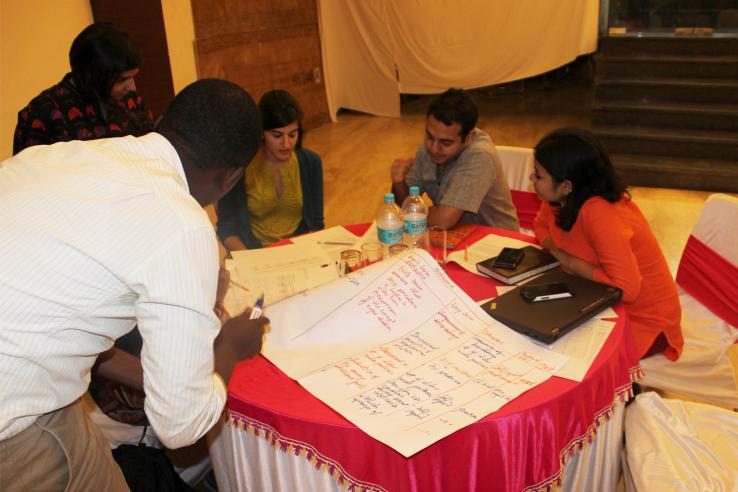Measurement and Survey Design Course 2018

Program objectives
Survey instruments are one of the most commonly used tools for collecting primary data from individuals and groups. Several factors need to be considered during the design and implementation phases to ensure that data collected through survey instruments is reliable and accurate.
J-PAL/CLEAR South Asia’s Measurement and Survey Design Course is a three-day introductory course that provides a thorough, step-by-step introduction to basic concepts of measurement theory and quantitative survey design. The course draws on J-PAL South Asia’s vast experience in running randomized evaluations involving extensive primary data collection. Through this course, participants will learn concepts related to what data to collect, how to design good survey instruments, why and how to pilot survey instruments, and how to develop field protocols, as well as best practices related to each.
Program focus
The course uses an array of pedagogical tools including several lectures, supplemental case studies, and experiential exercises to increase participants’ understanding of the process of designing and implementing effective survey questionnaires that yield high quality data. The following key concepts are covered:
- Creating accurate and precise measurements (SMART indicators), particularly for outcomes that are ‘hard to measure’
- Sources of measurement error and potential strategies to mitigate errors
- A step-by-step guide to designing a quantitative survey
- The advantages and disadvantages of paper and digital data collection
- Best practice for piloting survey instruments
- Considerations when designing field protocols to ensure survey quality, including structuring and training a field team
- Real world examples from randomized evaluations of collecting quantitative data on topics such as education, health, gender, etc.
- Understanding and using a theory of change framework to inform indicator selection
We recommend that interested individuals review the sample agenda to determine the applicability of the course content to their learning objectives. Please note that this is a sample agenda provided for reference only. The final agenda for the 2018 course may vary.
This course is at a basic to intermediate level and is intended for individuals who are looking to build their foundational understanding of the above concepts.
Target audience
The course content covers practical and theoretical aspects of collecting data and is relevant for individuals leading data collection efforts at their respective organizations or commissioning data collection from an external organization. The course is specifically intended for researchers, monitoring and evaluation professionals, and other individuals looking to build and/or refresh their knowledge of fundamental skills for collecting primary quantitative data.
The Measurement and Survey Design course has run since 2015 and has included participation from organizations such as Aga Khan Rural Support Program, BRAC, British Council, CARE India, Clinton Health Access Initiative, Oxford Policy Management, Pratham, Population Council, TATA Sustainability Group, Water Aid, and NITI Aayog, among others. Previous participants have found the course to be relevant and useful for their work:
“I attended the J-PAL/CLEAR Measurement and Survey Design Course in 2017. The course covered a wide range of subjects in a short span of time in a clear, concise and succinct manner, covering both theoretical as well as practical aspects. It was extremely useful to me in thinking through our 2017 study on Teachers’ Time Allocation, particularly with respect to designing survey questionnaires in more pertinent ways and adopting a clear theory of change. The course is a great tool to assist in better conceptualization at the stage of research design, and I would recommend it strongly to anyone looking to streamline their data collection and measurement strategies at the outset. It provides a skillset that is useful across domains, over time.”
Key information
For more information about the course, including the fee structure, please visit the Measurement and Survey Design course page. The last date to submit an application form is April 11, 2018.
Contact: Gargi Saripalli ([email protected])